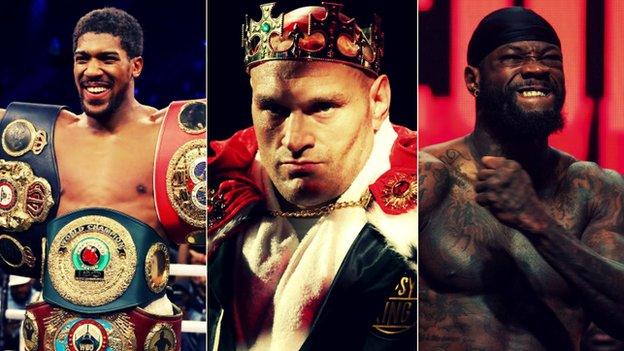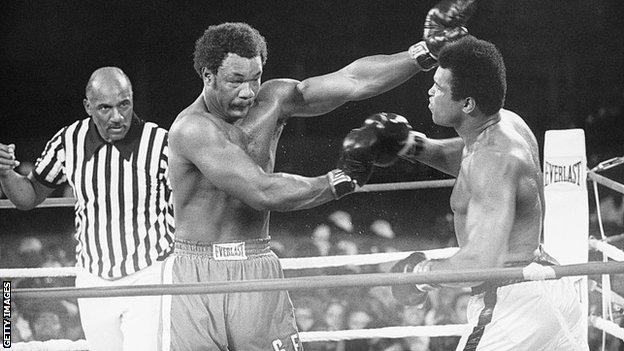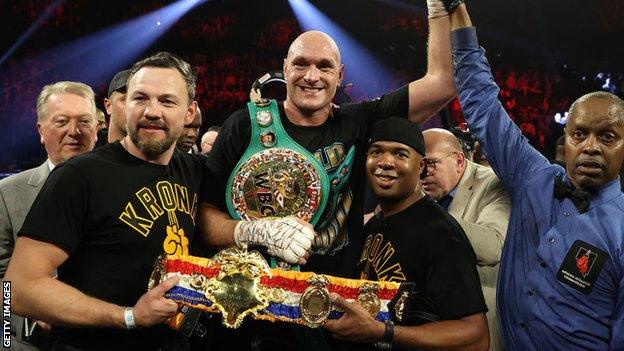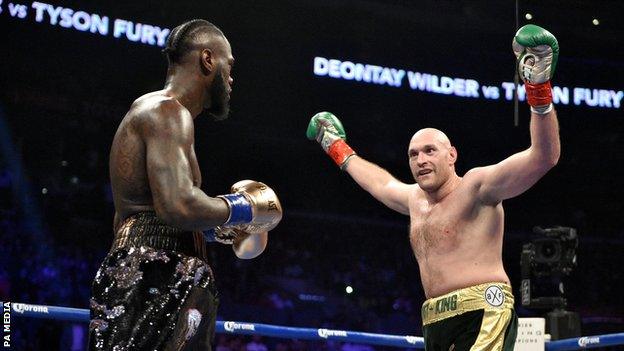Fury, Wilder, Joshua & Pulev: Costello & Bunce answer your questions
- Published

Joshua (left) holds three world titles and Fury (centre) one after his win over Wilder
Will Anthony Joshua and Tyson Fury ever fight? Why is Fury facing Deontay Wilder in another rematch? Are heavyweight boxers as good as they once were? And just how much does a training camp cost?
In the wake of Fury's win over Wilder, a third bout between the pair being confirmed and Joshua's fight with Kubrat Pulev being announced, we asked the BBC Sport audience to send in questions about the heavyweight division.
Mike Costello and Steve Bunce have responded below but, as Monday was the 5 Live Boxing Podcast's third birthday, they each felt it right to ask a question of their own first.
Bunce: Joshua-Pulev or Fury-Wilder III - which one piques your interest?
Costello: They are of equal interest to me because of what happens further down the line. Both of them have to win for this massive Joshua v Fury occasion to happen.
Yes, Wilder was emphatically beaten by Fury in Las Vegas but he does have the dig, that right hand. If he tries to stand his ground in the middle of the ring then there is a chance he can land that shot.
I believe Pulev exists in that rung below the absolute elite and Joshua is at a stage where he is having to prove himself again, so there is jeopardy. The danger for Joshua is he tries to look too impressive. The key for Joshua is to fight his fight - not the fans' fight, the media fight. It's not a politician's answer - I am fascinated by both fights.
Costello: So Steve, will we see Joshua v Fury?
Bunce: In theory, it could be in December but I just can't see Fury fighting three times in a year. I can't see either of them fighting in December. It feels like a May fight next year. But would Joshua just work on the one fight this year? Would Fury be happy going from July, when he's meant to face Wilder, and through the rest of the year without fighting? That's an awful long time for a man who tells us he's not happy if he can't train on a Sunday.
A fourth Fury v Wilder bout? Your questions answered...

Wilder and Fury are set to a fight a third time, with 18 July the likely date
Nik: Why, after having two fights, do promoters see fit to write in a third? The better boxer has been established.
Bunce: That is just a case of the fighters, managers and promoters going into it thinking how big the business will be and if you didn't go in with a third fight someone else might grab hold of it. If the trilogy between Wilder and Fury does the business I expect it will do, I still think there will be a vast crowd there.
What is the situation with Dillian Whyte as the WBC mandatory challenger if Joshua and Fury is agreed for the end of this year? Jack Bradley
Costello: There is a sense that the governing bodies can introduce rules to suit themselves. But there are rules about unification fights like Joshua-Fury where they take precedence over the rights of a mandatory challenger.
In the age of social media, everything is hyperbole. Where do you think this current generation really stands with the 1970s and 1990s eras? Jason
Costello: In the 70s you are are referring to Muhammad Ali, Joe Frazier, George Foreman and Ken Norton. In the 90s it is Lennox Lewis, Evander Holyfield, Riddick Bowe and fragments of Mike Tyson. If we are ranking those, the 70s is best, the 90s second and this era third. But it may well move up the order if we see Joshua against Fury and the likes of Joe Joyce and Daniel Dubois move through. There is still time for this era to get a whole lot better.
Bunce: If we get three years of concentrated fights - a first Joshua-Fury fight, a rematch, a couple of younger fighters coming in. Throw Whyte in. If they all fight one another, there may not be a Mike Tyson, a Muhammad Ali or a George Foreman - and those decades were staggering - but I still think these guys can entertain us for an awful lot of years.

George Foreman and Muhammad Ali formed part of a thriving 1970s heavyweight scene
Are there structural reasons why British boxers are dominating at heavyweight or have we just lucked out with Joshua and Fury? Samuel Roberts
Costello: I'm not sure it's anything to do with luck but it is a coincidence that two terrific heavyweights came through at the same time and in a different way. Fury had a terrific amateur career but didn't go into the Great Britain squad and turned pro after winning the national amateur title in 2008. Joshua had the benefit of all the international experience as an amateur. It's about a lot more than luck.
Bunce: The Americans we know of in recent years - guys like Deontay Wilder- came to boxing late. Wilder walked in at 19 years of age. Had basketball or American football worked for him he may not have walked into a gym. In America they have other sports competing for these fighters.
If Fury-Wilder III happens and Wilder wins, do you think they will fight a fourth time? Ross
Bunce: Yes, I do. If Wilder comes out in the third fight and catches Fury with those right hands and catches him with a proper shot, why couldn't he knock Fury out? If he does, there's definitely a fourth fight.
Should the division be split into two or three weight categories? Tom Andrews
Costello: They are split into heavyweight and super-heavyweight in the amateur ranks - 14st 4lb and below is heavyweight and over that is super-heavyweight. I don't want to see that in the professional ranks. Deontay Wilder at 15st or so has shown that he punches hard enough and can survive against the bigger boys.

Only Fury and Ali have regained the Ring magazine belt - held by his trainers here - in heavyweight history
In your opinion, does the Ring magazine belt mean that the holder is the best world champion? If not, which belt has the most respect? James McCallum
Costello: The Ring belt dates back to the 1920s when the Ring magazine was known as the bible of boxing. It doesn't carry the same kind of weight now or credibility but Fury is one of many who is very proud to hold it.
Bunce: I am turning very anti-belt, bauble or diamond. If you listen to the podcast carefully we try to limit the belt references as much as possible. I am pulling away. I don't dislike the people behind the belts but I am becoming increasingly less of a fan of the belts, I really am.
What is the earliest you see the winner of Daniel Dubois v Joe Joyce challenging for a world title? Luke
Costello: Given all we have said about how the fights are queuing up, it will not be 2020, that's for sure. That should suit them both and they can move into contention next year. The bookmakers have Dubois a long odds-on favourite. I don't see it that way and think it's an even-money fight.
How much does it cost for a typical camp for a heavyweight in the build-up to a world title fight? Geraint
Costello: It depends. Joshua went to Florida for his training camp before facing Ruiz the first time. That would cost a lot more than in his usual base in Sheffield.
Bunce: Let's say a 10-week camp in a house that's $5,000 a week. Maybe they do a deal for $12,000 for the month, so that's $36,000 for the entire camp before you start. Then you have half a dozen sparring partners. You have to pay them, feed them and put them up. I wouldn't have thought the tax man sees less than a couple of hundred thousand dollars put through for a big camp like that.
- Published29 November 2021
